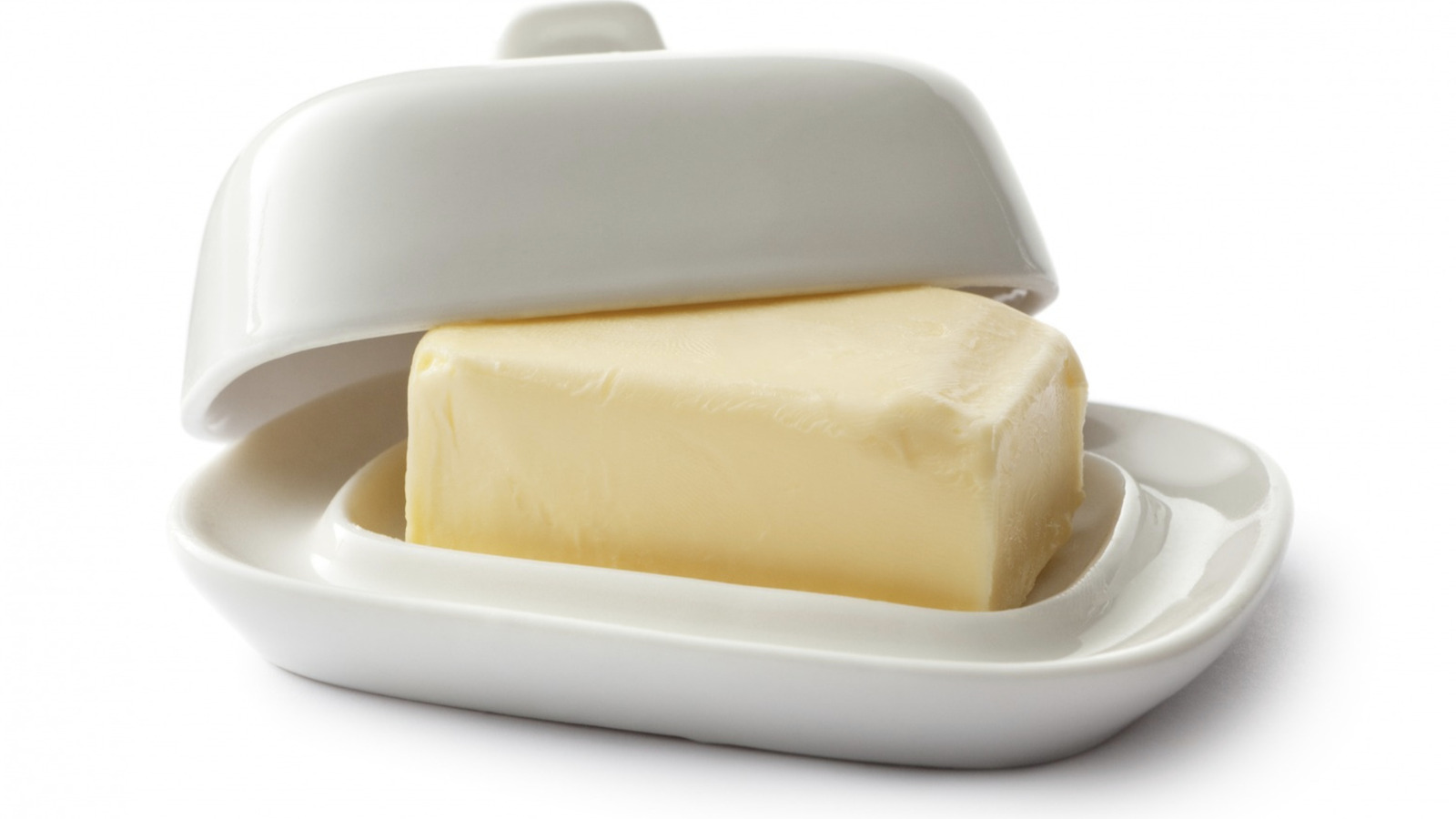Butter Is Usually Gluten-Free, But There’s A Catch – Mashed

Butter Is Usually Gluten-Free, But There’s A Catch – Mashed
The word “gluten” has received an unwanted reputation in recent years, but it is the name for the proteins in wheat. They are important, because these building blocks hold the food together. Nevertheless, for some, the body interprets gluten as a toxin and reacts negatively.
Such negative reactions can range from bloating and diarrhea to weight loss and intestinal damage, and so, many have welcomed an influx of gluten-free alternatives to supermarkets with open arms. While some still simply associate gluten with bread, it can be found in a variety of foods, ranging from baked goods and breakfast staples to candy and snacks like potato chips.
Then there’s the unique case of butter, typically safe for people who cannot eat gluten. It is made by agitating the fat found in milk cream, causing membranes to break open and the fat clumping together. While butter contains milk protein, it does not naturally contain any type of wheat protein — however, there are still instances when butter might not be gluten-free after all.
When could butter contain gluten?
 banjongseal168/Shutterstock
banjongseal168/Shutterstock
While plain butter, as well as margarine, fresh milk, and cream, are fairly safe food options for individuals on a gluten-free diet, there should be concern if these food items are not labeled as plain or gluten-free. For example, a spread could contain additives that include gluten. Also, some flavors are made by using wheat protein.
To be absolutely certain there is no gluten in butter, just read the label. The Food Allergen Labeling and Consumer Protection Act is very strict about FDA-regulated food products being properly labeled. If wheat, barley, rye, or malt are not listed as ingredients, wheat protein should not be in your butter.
However, just because the butter you buy contains no gluten in the ingredients, that doesn’t protect you from accidental cross-contamination that may occur at home. This can happen when someone cuts a slice of bread, then uses the same knife in the butter. So, care must be taken at all times to protect people who are sensitive to wheat protein.
Related News & Content
-

Archive pagination not working
Archive pagination not working,I am trying to add pagination for my Archive. I want to show 12 posts per page and then show the 'next' / 'previous' buttons. When I manually change the value of the $paged variable, the 1 into a ... Tags: archives pagination stackexchange.com WordPress Development Stack Exchange -

How to make my logged-in user-role shortcode displaying name instead of slug?
How to make my logged-in user-role shortcode displaying name instead of slug?,I am trying to get my frontend to show the role of a logged-in user via Shortcode. I have the Shortcode functional (see below) but it displays the slug and not the real name in the frontend. This i... Tags: functions shortcode stackexchange.com user roles WordPress Development Stack Exchange -

Fatal error: Uncaught Error: Class ‘WP_Block_Styles_Registry’
Fatal error: Uncaught Error: Class 'WP_Block_Styles_Registry',I am having some issues determining the solution to this problem below. The website was sent to our team to fix. Turned on error reporting in wp-config.php: define('WP_DEBUG', true); Word... Tags: filters hooks php stackexchange.com WordPress Development Stack Exchange wp enqueue style wp register script -

Programmatically set current-menu-item using wp_nav_menu
Programmatically set current-menu-item using wp_nav_menu,I'm calling wp_nav_menu programmatically on a class and I'd like to be able to set the field that will be shown as the current-menu-item but I don't see an argument for that. It seems like I may b... Tags: menus navigation stackexchange.com WordPress Development Stack Exchange -

Always show Next and Previous button in wp_link_pages ?
Always show Next and Previous button in wp_link_pages ?,How do we get wp_link_pages() to show the Next and Previous button when it is the start of the multi-page post as well at the end of a multipage. Currently it only shows Next if it is the first pag... Tags: pagination stackexchange.com WordPress Development Stack Exchange -

Excluding top level from taxonomy and post loop
Excluding top level from taxonomy and post loop,I've got a custom post type / taxonomy. I've created a list that shows all the categories and the posts in them. I have set up a top level category (taxonomy) that has two sub categories. I want my Tags: custom post types custom taxonomy stackexchange.com WordPress Development Stack Exchange -

Add URL to selected post in meta box
Add URL to selected post in meta box,How can I change this code $posts = get_posts(array('post_type'=> 'lesson', 'post_status'=> 'publish', 'suppress_filters' => false, 'posts_per_page'=>-1)); //here you add the ... Tags: metabox permalinks stackexchange.com WordPress Development Stack Exchange -

Architect of Israel’s judicial coup jeered at Holocaust memorial ceremony in New York
Architect of Israel's judicial coup jeered at Holocaust memorial ceremony in New York,Ceremony Was Disrupted by a Group of Israeli Expats Outraged by the Presence of Simcha Rothman – a Lawmaker From the Far-right Religious Zionism Party – Among the Guests of Honor Tags: haaretz.com Holocaust Israel News Judicial Coup -

One Holocaust survivor will mark her history differently after the horrors of Oct. 7
One Holocaust survivor will mark her history differently after the horrors of Oct. 7,Judith Tzamir, a Holocaust Survivor From Germany Who Moved to Israel in 1964, Will Make the Trip Back to Auschwitz for the First Time to Participate in March of the Living, a 2-mile March From Auschwitz to Birkenau, Joining October 7 Survivors and Released Hostages Tags: haaretz.com Holocaust Jewish World October 7 -

Carol Kirkwood stuns in figure-hugging dress amid BBC Breakfast technical chaos
Carol Kirkwood stuns in figure-hugging dress amid BBC Breakfast technical chaos,CAROL Kirkwood stunned in a figure-hugging dress amid a technical blunder. BBC Breakfast was flung into chaos this morning after a string of sound issues. However Carol, 61, was all smiles as she p… Tags: BBC BBC Breakfast BBC ONE Carol Kirkwood mirror.co.uk The Scottish Sun TV News TV UK daytime TV -

Families ‘to sue prison’ where loud inmates ‘terrorise kids’ with screaming
Families 'to sue prison' where loud inmates 'terrorise kids' with screaming,Residents living next door to a new prison who say their kids have to sleep wearing headphones and some leave during weekends due to the racket are threatening to sue the prison service Tags: mirror.co.uk Neighbours from hell prisons Scottish government The Mirror -

Doctor Strange’s Secret Wars Role May Be More Important Than You Thought – Looper
Doctor Strange's Secret Wars Role May Be More Important Than You Thought - Looper,According to entertainment leaker Alex Perez, Doctor Strange will find himself confronting his inner struggles as he headlines "Avengers: Secret Wars." Tags: Fiction Looper looper.com Marvel Cinematic Universe Science Star Wars The Universal Monsters franchise -
What Kris Jenner Has Said About Those O.J. Simpson Affair Rumors – Nicki Swift
What Kris Jenner Has Said About Those O.J. Simpson Affair Rumors - Nicki Swift,Over the years, plenty of gossip has swirled about the Kardashians. Here's what Kris Jenner has said on those affair rumors about O.J. Simpson. -
Why We’re Worried About Khloe Kardashian – Nicki Swift
Why We're Worried About Khloe Kardashian - Nicki Swift,Although Khloé Kardashian has seemingly picked up the pieces of her life after turmoil, there's no denying that we are still worried about the reality star. -

BAFTA Games Awards 2024: Baldur’s Gate 3 wins game of the year- Complete list of winners
BAFTA Games Awards 2024: Baldur's Gate 3 wins game of the year- Complete list of winners,Baldur's Gate 3 won five awards at the 20th BAFTA Games Awards, which were announced Thursday evening in London. Super Mario Bros. Wonder, Viewfinder, and Alan Wake 2 all received two awards each. Tags: BAFTA Games Awards breezyscroll.com -

Kanye West a suspect in battery case after man allegedly ‘assaulted’ his wife, Bianca Censori
Kanye West a suspect in battery case after man allegedly 'assaulted' his wife, Bianca Censori,Kanye West has been named as a suspect in a battery case in Los Angeles after allegedly hitting a man who grabbed his wife, Bianca Censori, according to reports. Tags: breezyscroll.com kanye west -
LG already did Apple’s controversial iPad Pro ad for a phone back in 2008 [Video]
LG already did Apple's controversial iPad Pro ad for a phone back in 2008 [Video],Apple is under fire for its new 'Crush' iPad Pro ad, but LG did the same thing back in 2008 for one of its older phones. Tags: 9to5Google 9to5google.com Apple lg -
How to do squats: Tips and guidance for beginners
How to do squats: Tips and guidance for beginners,Here’s how to do squats for the first time Tags: fitandwell.com
Warning: file_get_contents(https://www.scienceradars.com/wp-output-content.php?pg=1&cat=&kw=&lvl=): Failed to open stream: HTTP request failed! HTTP/1.1 526 in /home/wwwroot/xuenou.com/wp-content/themes/chromenews/template-parts/content.php on line 169
Warning: file_get_contents(https://www.bayuexiang.com/wp-output-content.php?pg=1&cat=&kw=&lvl=): Failed to open stream: HTTP request failed! HTTP/1.1 526 in /home/wwwroot/xuenou.com/wp-content/themes/chromenews/template-parts/content.php on line 173
TrendRadars
The Most Interesting Articles, Mysteries and Discoveries

Here Are 14 Oddly Specific People, Characters, And Things That These Met Gala Looks Have Been Compared To

The ‘New York Times’ attacks e-bikes while ignoring the real danger all around us

Here’s Everything We Know So Far About Hailey Bieber’s Pregnancy
WHO Recommends New Covid Shots Should Target Only XBB Variants

































































